Diving into the complex world of data analytics tools, businesses and individuals alike find themselves at a crossroads, choosing between the dynamic capabilities of Tableau and the comprehensive, integrated solutions offered by Zoho Analytics. Both platforms have carved out significant niches in the data visualization and business intelligence landscape, but the question remains: which one is the best analytics tool for you? Let’s peel back the layers of these two giants, starting with a critical aspect of any analytics tool—Ease of Use and Learning Curve.
Tableau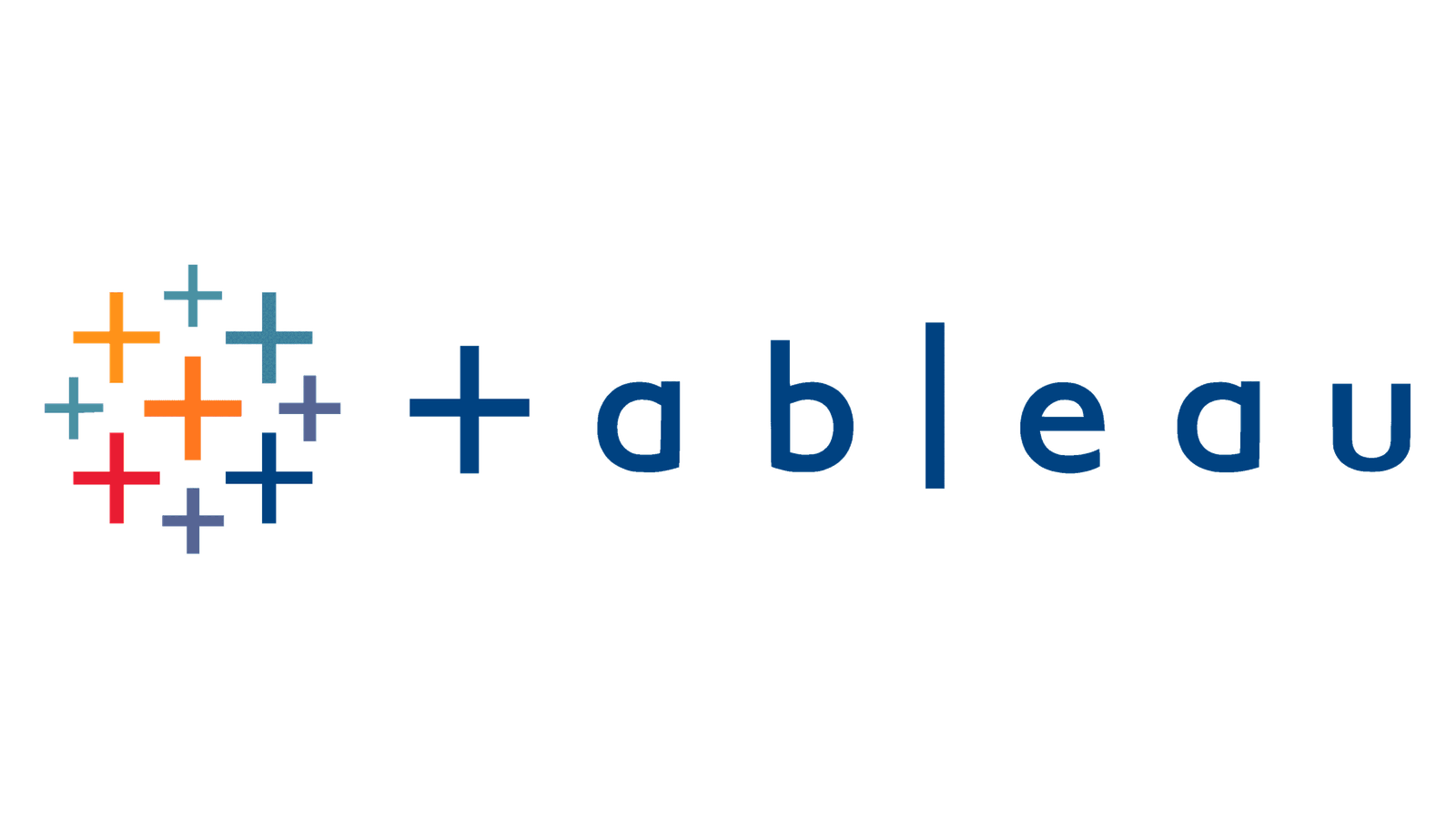 | Zoho Analytics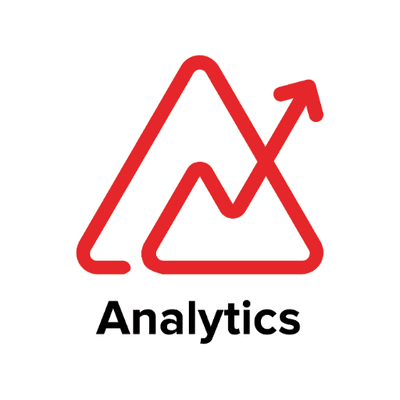 |
|---|---|
| G2 Score – 4.4 out of 5 stars | G2 Score – 4.3 out of 5 stars |
| TrustRadius Score – 8.2/10 | TrustRadius Score – 8.1/10 |
Ease of Use and Learning Curve
In today’s fast-paced digital environment, the accessibility of a tool can make or break its effectiveness within an organization. An intuitive interface and a gentle learning curve are not just nice-to-have features; they are essential for the rapid adoption and effective utilization of analytics platforms across teams of varying skill levels.
Tableau: The Powerhouse of Visualization
Tableau has long been revered for its advanced data visualization capabilities, allowing users to turn complex datasets into insightful, interactive visualizations with ease. Despite its powerful features, newcomers might find Tableau’s vast array of options a bit overwhelming at first glance. However, Tableau has made significant strides in user education, offering a wealth of tutorials, training sessions, and a supportive community forum to help users climb the learning curve. For organizations willing to invest in mastering its depths, Tableau emerges as a formidable tool, capable of accommodating the nuanced analytics needs of businesses large and small.
Zoho Analytics: Seamless Integration Meets User-Friendliness
On the flip side, Zoho Analytics prides itself on a more streamlined approach, emphasizing ease of use without sacrificing depth. Its interface is designed to be approachable, making it an attractive option for those less familiar with data analytics. Zoho Analytics stands out for its seamless integration with the broader suite of Zoho applications and numerous third-party services, providing a cohesive ecosystem for data analysis. This integration, coupled with its user-friendly design, makes Zoho Analytics particularly appealing to small and medium-sized businesses looking for a comprehensive analytics solution that doesn’t require a steep learning curve.
Integration with Third-Party Applications
In an era where businesses use a myriad of applications for their daily operations, the ability of an analytics tool to integrate with these third-party applications is invaluable. It not only streamlines workflows but also ensures that insights gained are as comprehensive and actionable as possible.
Tableau: Extensive and Flexible Integration
Tableau is renowned for its broad integration capabilities, allowing it to connect with various data sources, including cloud services, databases, and many other third-party applications. This flexibility ensures that businesses can harness data from across their entire digital ecosystem, providing a holistic view of operations, customer interactions, and market trends. Tableau’s support for a wide range of data connectors means that it can serve as a central platform for data analytics, enabling users to aggregate and visualize data from multiple sources seamlessly.
Zoho Analytics: Seamless Integration within the Zoho Ecosystem and Beyond
Zoho Analytics offers robust integration capabilities, particularly within the Zoho ecosystem, making it an ideal choice for businesses already using Zoho applications. It seamlessly pulls data from Zoho CRM, Zoho Projects, and other Zoho apps, alongside offering integration options with external data sources such as social media platforms, cloud storage services, and third-party applications. This deep integration allows for an efficient flow of data across platforms, enabling businesses to generate comprehensive reports and insights that reflect their entire operational landscape.
User Support and Educational Resources
Effective support and comprehensive educational materials can significantly enhance the user experience, especially for platforms as robust and feature-rich as Tableau and Zoho Analytics. These resources not only help users solve technical issues but also empower them to leverage the full potential of the analytics tools at their disposal. The accessibility and quality of user support and educational resources are key factors that can influence the decision-making process when choosing an analytics platform. They are crucial for onboarding, troubleshooting, and advancing users’ knowledge over time.
Tableau: Extensive Learning Resources and Community Support
Tableau is well-known for its extensive array of educational resources and a highly engaged user community. It offers a comprehensive learning portal that includes free training videos, detailed guides, webinars, and interactive forums. Tableau’s community is one of its strongest assets, providing a platform for users to share knowledge, insights, and visualization templates. Furthermore, Tableau Public, a free version of the software, allows users to explore and learn from the work of others. For direct support, Tableau provides various channels, including a knowledge base, customer support tickets, and even dedicated account managers for enterprise customers.
Zoho Analytics: Streamlined Support and Integrated Learning
Zoho Analytics focuses on providing streamlined support and integrated learning resources designed to get users up to speed quickly. Its support system includes a detailed knowledge base, email support, and live chat options. Zoho also offers a series of webinars and tutorial videos that cover both basic and advanced features, catering to users at different proficiency levels. Within the Zoho ecosystem, users benefit from a seamless experience, with support and resources readily available. The Zoho user community, while smaller than Tableau’s, offers a space for users to seek advice and share best practices specific to Zoho Analytics.

Related: Check out our free SEO suite

Customization and Advanced Analytics Capabilities
The power of an analytics tool often lies in its ability to be customized to fit the unique needs of a business and to offer advanced analytical features that can uncover deeper insights from the data.
Tableau: Leading with High Customization and Powerful Analytics
Tableau sets the standard for customization within the analytics tool spectrum. It offers an incredibly flexible environment where dashboards and reports can be tailored to the precise needs of any business. This customization extends to the creation of complex calculated fields, parameters, and the use of its powerful analytics engine to conduct sophisticated data analysis, including predictive analytics and trend analysis. Tableau’s strength lies in its ability to not just visualize data, but to transform it into actionable insights through deep analytical capabilities, making it an excellent choice for businesses that require detailed analysis and have the resources to delve into more complex data exploration.
Zoho Analytics: User-Friendly Customization with Robust Analytics
Zoho Analytics provides a user-friendly platform with robust customization options designed to meet the needs of businesses looking for an accessible yet powerful analytics solution. It allows users to create personalized dashboards and reports with ease, thanks to its drag-and-drop interface. While it may not offer the same depth of customization as Tableau, Zoho Analytics includes a range of advanced analytical features such as AI-powered insights, predictive analytics, and an extensive set of chart types. This makes it a strong contender for businesses seeking a balance between ease of use and the ability to perform advanced data analysis.
Collaboration and Sharing Features
This aspect is pivotal for businesses aiming to democratize data access across teams and ensure that insights lead to collective action. In today’s interconnected work environment, the ability for team members to collaborate on data analysis and share insights effortlessly is more important than ever. Both Tableau and Zoho Analytics recognize this need and offer features to facilitate collaboration and sharing, but they approach it differently.
Tableau: Advanced Collaboration for Data-Driven Cultures
Tableau shines when it comes to enabling a data-driven culture through advanced collaboration features. It allows users to share dashboards and insights across the organization with ease, supporting both on-premise and cloud-based sharing through Tableau Server and Tableau Online. Moreover, Tableau’s robust permission settings ensure that sensitive data remains secure while still being accessible to authorized users. Interactive dashboards can be embedded in websites or shared directly via links, enhancing the reach of data insights. Tableau also promotes an active community where users can exchange tips, dashboards, and visualizations, further fostering a collaborative environment.
Zoho Analytics: Simplified Sharing and Collaboration
Zoho Analytics emphasizes simplicity in its collaboration features, making it straightforward for teams to share reports and dashboards. Users can easily publish their findings and grant access to team members, with options for viewing or editing based on user roles. Zoho Analytics also integrates well with other Zoho Suite applications, enhancing its collaboration capabilities within the Zoho ecosystem. The platform offers embedded analytics and portal customization, allowing businesses to share insights with external stakeholders in a controlled and secure manner. While perhaps not as extensive as Tableau’s offerings, Zoho Analytics provides all the essential tools for effective collaboration and sharing within and outside the organization.
Customer Support and Learning Resources
The availability and quality of support provided by an analytics platform can greatly influence user satisfaction, adoption rates, and the overall effectiveness of the tool within an organization. The complexity of analytics tools and the critical role they play in business decision-making underscore the importance of having accessible, responsive customer support and comprehensive learning resources.
Tableau: Comprehensive Support and Rich Educational Content
Tableau is renowned not just for its powerful analytics capabilities but also for its extensive support and educational resources. It offers a wide range of learning materials, including online tutorials, forums, live training sessions, and user groups, designed to help users at all skill levels maximize their use of the platform. Tableau’s community is active and supportive, providing a platform for users to share knowledge, tips, and even custom visualizations. On the support side, Tableau provides assistance through a variety of channels, ensuring that users can find help when they need it, whether it’s troubleshooting technical issues or seeking advice on best practices.
Zoho Analytics: User-Friendly Support Tailored to Business Needs
Zoho Analytics focuses on making customer support and learning resources as user-friendly as the platform itself. It offers a detailed knowledge base, video tutorials, and webinars that cater to both new and advanced users. Zoho’s support team is accessible through email, phone, and live chat, providing personalized assistance to resolve issues promptly. Additionally, Zoho Analytics benefits from being part of the larger Zoho ecosystem, which means users can easily find guidance not just on analytics but also on how to integrate and use the platform effectively with other Zoho apps.
Pricing
Tableau:
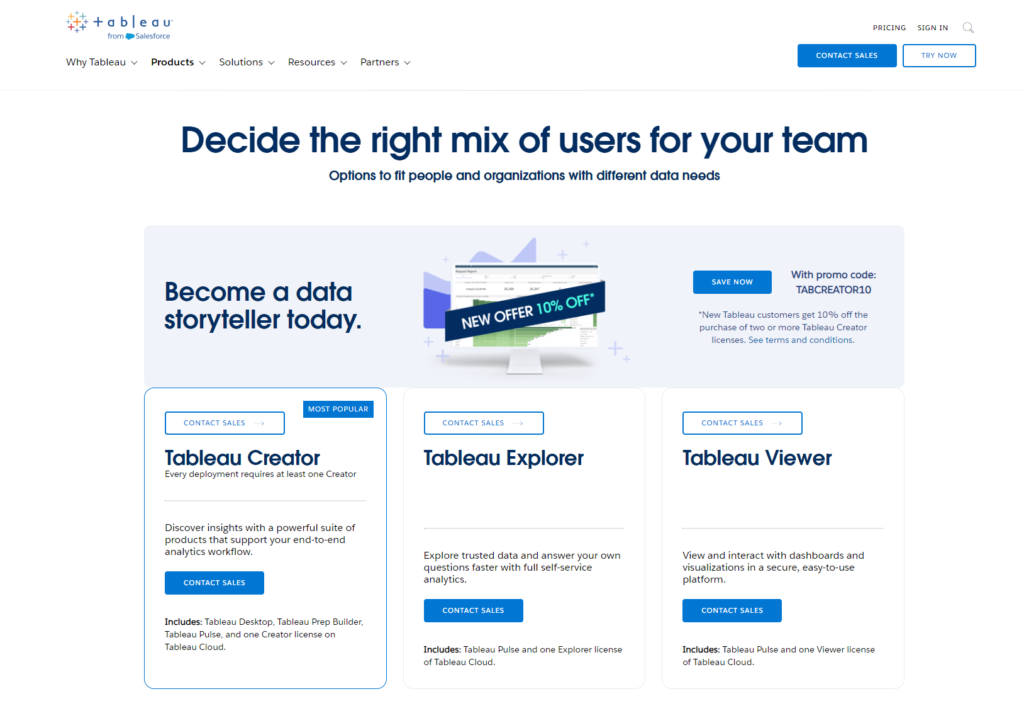
Zoho Analytics:
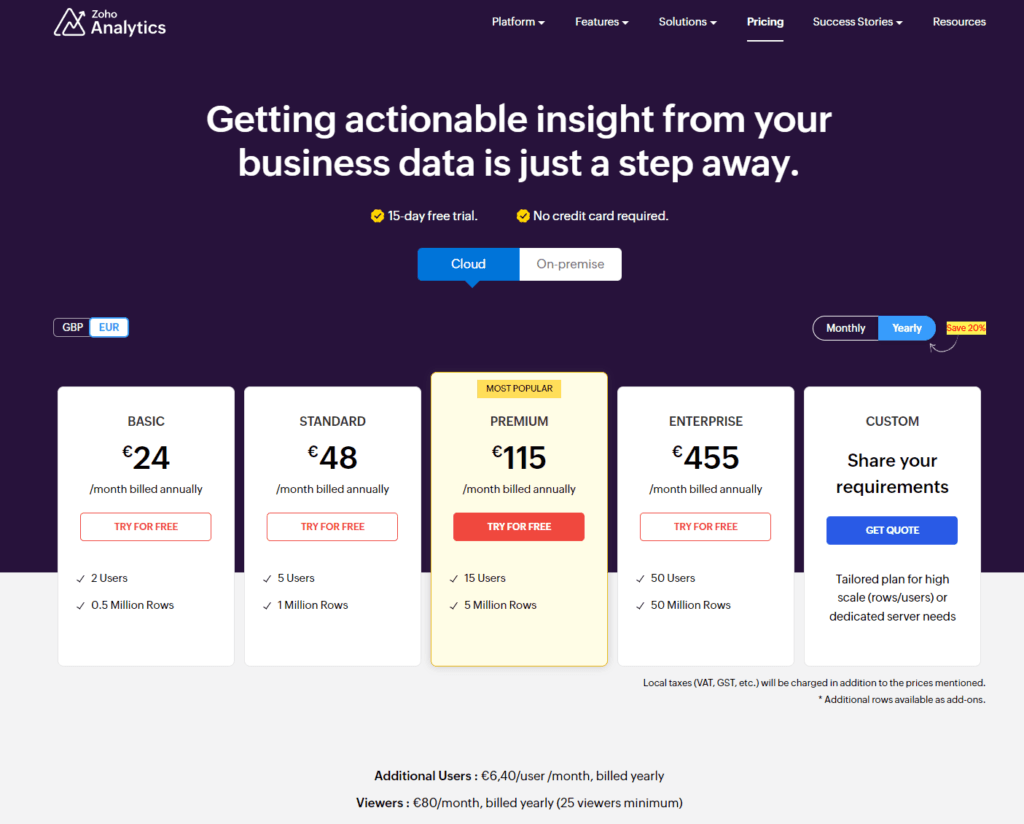
Conclusion
In concluding the comparison between Tableau and Zoho Analytics, we’ve traversed a range of pivotal aspects that define and differentiate these powerful analytics platforms.
Tableau is distinguished by its robust data visualization capabilities, extensive customization options, and broad integration with a wide array of data sources. It caters to organizations with complex analytics needs, offering deep insights across multiple departments. Its rich educational resources and vibrant community support further establish Tableau as a platform conducive to fostering a data-driven culture within large teams and organizations. Tableau is ideal for businesses that prioritize detailed data analysis and require a tool that can scale with their growth, offering powerful analytics capabilities that support data-driven decision-making at every level.
Zoho Analytics, on the other hand, stands out for its user-friendly approach, offering a seamless experience particularly for those already within the Zoho ecosystem. With streamlined data integration from Zoho applications and other sources, coupled with effective customization and real-time analytics capabilities, Zoho Analytics provides valuable insights for small to medium-sized businesses. Its focus on ease of use, combined with efficient customer support and integrated learning resources, makes Zoho Analytics a compelling choice for businesses seeking to quickly leverage analytics for strategic insights without the steep learning curve associated with more complex platforms.
Read Next:
- GetResponse vs Zoho Campaigns: The Best Email Marketing Tool for 2024
- AWeber vs ActiveCampaign: The Best Email Marketing Tool
- Constant Contact vs Campaigner: Best Email Marketing Tool
- GetResponse vs Omnisend: The Best Email Marketing Tool for 2024
- AWeber vs Benchmark Email: The Best Email Marketing Tool













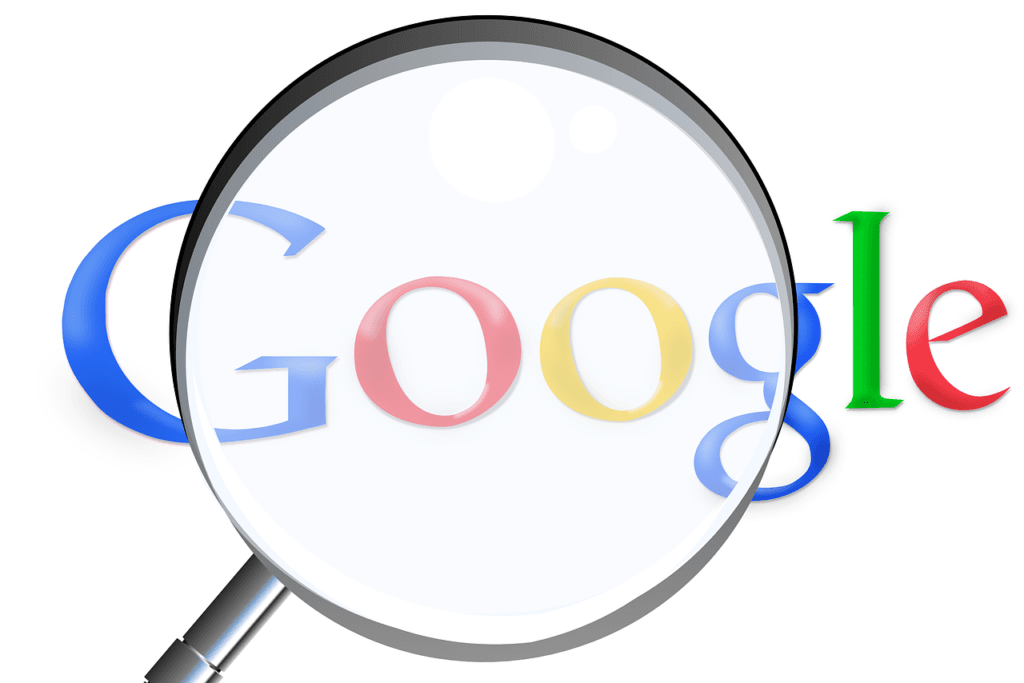








Comments are closed.